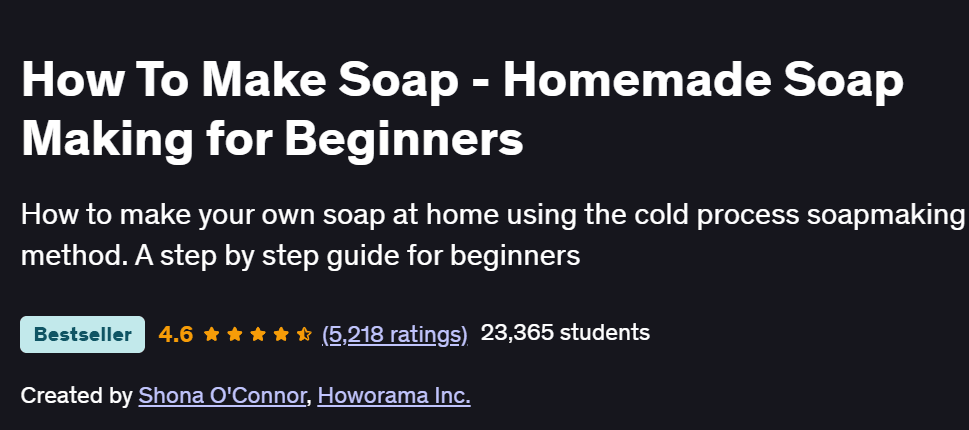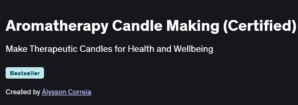What you will learn in How To Make Soap – Homemade Soap Making for Beginners Course
Understand the basics of soap making, including the ingredients and tools required.
Learn different soap-making methods, including cold process, melt and pour, and hot process.
Study how to choose the right oils and scents to create your own custom soap recipes.
Explore the process of curing, cutting, and storing soap.
Gain practical skills for making soap at home, either for personal use or as a small business venture.
Program Overview
Introduction to Soap Making
⏳ 1-2 hours
Learn the history and science of soap making, including the basic chemical reaction involved in saponification.
Study the tools and materials you need, including oils, lye, and fragrances.
Understand safety precautions and how to handle lye safely during the soap-making process.
Cold Process Soap Making
⏳ 2-3 hours
- Learn how to make soap using the cold process method, which involves mixing oils and lye to create soap without heat.
- Study how to choose the right oils and combine them for the desired properties in your soap.
- Learn how to color and scent your soap with natural or synthetic ingredients.
Melt and Pour Soap Making
⏳ 1-2 hours
- Study how to use pre-made soap bases to create custom soap by melting and pouring.
- Learn how to incorporate colors, fragrances, and additives like herbs or exfoliants.
- Explore how to make simple, quick soap designs with minimal equipment.
Hot Process Soap Making
⏳ 2-3 hours
- Learn the hot process method, where the soap mixture is cooked to accelerate the saponification process.
- Study how to manage temperature, time, and ingredients to create high-quality soap.
- Understand how to troubleshoot common hot process issues and improve your soap’s texture and appearance.
Creating Custom Soap Recipes
⏳ 2-3 hours
Learn how to create your own unique soap recipes, customizing the ingredients for different skin types and purposes.
Study how to balance oils for moisturizing, cleansing, and lathering properties.
Explore different fragrances and essential oils for therapeutic or aesthetic purposes.
Curing, Cutting, and Storing Soap
⏳ 1-2 hours
Understand how to properly cure soap to allow it to harden and develop its full lathering potential.
Learn how to cut soap into bars and store it to prevent spoilage.
Study how to store soap long-term for use or sale.
Final Project: Create Your Own Soap Line
⏳ 2-3 hours
- Apply what you’ve learned by creating a series of custom soaps, focusing on unique recipes, scents, and colors.
- Develop a product line and understand how to present and package your soaps for personal use or sale.
- Receive feedback on your project to refine your techniques and presentation.
Get certificate
Job Outlook
Soap making has seen a rise in popularity with the demand for natural and handmade products.
Many soap makers sell their products online, at markets, or through local shops, with earnings varying depending on production volume and pricing.
Starting a soap-making business can be profitable, with many small businesses generating $40K-$100K annually, depending on market reach.
Specification: How To Make Soap – Homemade Soap Making for Beginners Course
|
FAQs
- No chemistry background is needed; the course explains the science in simple terms.
- All safety precautions for handling ingredients like lye are clearly demonstrated.
- You’ll start with beginner-friendly methods and gradually move to more advanced techniques.
- The focus is on practical learning, so you’ll feel confident even if you’ve never crafted before.
- Essential items include oils, lye, a mixing container, a stick blender, molds, and safety gear (gloves, goggles).
- Ingredients are affordable and widely available online or at local craft/health stores.
- You can start with simple oils like olive or coconut before experimenting with specialty ones.
- Many tools you already have in your kitchen (measuring cups, spatulas) can be repurposed for soap-making.
- Depending on the method, hands-on preparation takes 30 minutes to 2 hours.
- Cold process soaps need several weeks of curing, while melt-and-pour soaps are ready almost immediately.
- Hot process soaps take longer upfront but are usable sooner than cold process versions.
- With practice, your preparation and cleanup time will get faster.
- Yes, many soap makers sell products at local markets, online shops, or boutiques.
- The growing demand for natural, eco-friendly, and artisanal soaps creates strong market potential.
- The course provides foundational knowledge, but you may need to study packaging, pricing, and marketing separately.
- With creativity in scents, colors, and branding, your soaps can stand out in a competitive market.
- Yes, you can use natural oils, essential oils, and plant-based colorants.
- Additives like herbs, clays, and oats create skin-friendly, eco-conscious soaps.
- Reusable molds and recyclable packaging make your soap-making more sustainable.
- Homemade soap reduces reliance on mass-produced products with artificial chemicals.





